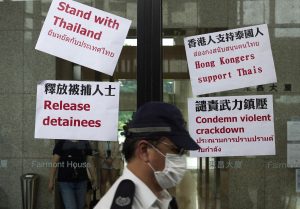Standing outside the Thai Consulate in Hong Kong, a group of activists chanted “Stand with Thailand,” raising the Hunger Games-inspired three-finger salute that has become a common sight on the streets of Bangkok after months of protest.
“Their protesters are the same as us,” said Joshua Wong, Hong Kong activist who has become a symbol for the city’s pro-democracy movement, during the Monday rally. “They want freedom and democracy… Thailand is not just a place where Hong Kongers go on holidays.”
The demonstration is one of a growing number of solidarity rallies cropping up worldwide – including in Taiwan, Canada, Europe, and the United States – in support of the tens of thousands of mostly-young Thai protesters taking to the streets. In the face of intensifying crackdowns, protesters are calling for a new constitution, the removal of Prime Minister (and former general and coup leader) Prayut Chan-o-cha, and the reform of the monarchy – a traditionally revered symbol of national unity.
Transnational solidarities with Thailand have been strengthened by the “Milk Tea Alliance,” an online coalition that has since spilled out of the digital sphere and into physical protests. The alliance emerged earlier this year after a Thai actor liked a tweet referring to Hong Kong as a country – igniting an spat between Thai netizens and Chinese nationalists that escalated after the involvement of Taiwan and Hong Kong pro-democracy supporters. Since then, the conflict has evolved into a grassroots campaign against Chinese nationalism and authoritarianism that uses the hashtag #MilkTeaAlliance, which refers to Hong Kong, Taiwan, and Thailand’s shared love of the beverage.
The alliance has fueled connections between activists across these territories, who are sharing protest tactics as well as amplifying one another’s messages. In Thailand, protesters have adopted tactics used by Hong Kong protesters – such as conducting leaderless, fluid protest gatherings coordinated through social media that spontaneously emerge and disperse from various locations. They’ve also begun to widely use encrypted apps such as Telegram, which was popular among Hong Kong protesters, and mobilizing on Twitter.
Yet as #MilkTeaAlliance continues to trend and attract the attention of mainstream media, some question its value beyond memes, hashtags, and solidarities. The linking of the Thai protests – born out of simmering domestic tensions largely unconnected to China – to the anti-Chinese Communist Party movements in Hong Kong and Taiwan may not be particularly helpful for understanding the conflict, some argue. It may even distract from the movement’s core issues, according to Enze Han, associate professor of politics and public administration at the University of Hong Kong.
“I feel that when people talk about Milk Tea Alliances, there’s a convergence in opinions in Hong Kong and Taiwan. Media in Hong Kong and Taiwan tend to overplay that,” said Han, who questioned the degree of anti-Chinese sentiment in Thailand and the significance of social media movements. “Thailand has multiple divisions in society… who don’t necessarily buy into these rhetorics of mobilizations.”
While the protests may not be directly connected with China, others say it has contributed to a growing awareness of the Communist Party’s influence in Thailand. Wasana Wongsurawat, associate professor history at Chulalongkorn University, says the alliance has highlighted problematic issues surrounding Sino-Thai relations. It has also led people to question the close relationship between the monarchy and the CCP, which has strengthened since the latest coup, she added.
“In Thailand, there’s a feeling that the government acts like we are a province of China. The Milk Tea Alliance raises questions, suspicions on the credibility and popularity of the king’s younger sister, who is by far the most popular figure in the Thai monarchy,” Wongsurawat said. “It sheds light on the fact that this relationship… is questionable, and (asks) is this really an obstacle for democratization in Thailand?”
For Netiwit Chotiphatphaisal, a prominent Thai student activist, the alliance has been a source of inspiration and motivation. It has also helped internationalize the movement, he added.
Following the solidarity rally in Hong Kong, he posted a photo on Twitter with fellow activists holding banners with the slogan #save12hkyouths, calling for the release of Hong Kong detainees in Mainland China.
“Thailand has become a strategic point for China and many trade areas have been granted to China. It’s made people think,” Chotiphatphaisal said. “I think Hong Kong plays an important role. If we don’t deal with China, we can’t achieve democracy.”

































